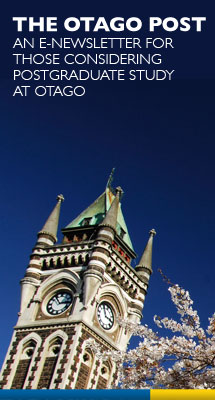 Friday 11 March 2016 10:42am
Friday 11 March 2016 10:42am
OUSA 2009 New Supervisor of the Year,
Dr Kelly Hare
There's more to thesis supervision than meets the eye, as those who have recently won plaudits for their supervisory roles confirm. The OUSA 2009 Supervisor of the Year Dr Alan Davison (Music) and New Supervisor of the Year Dr Kelly Hare (Zoology) both agree that the act of supervision is a big commitment, but one well worth the effort.
“It's an important part of my job, and a very rewarding one,” says Alan. “Research students stimulate your own thinking and help you become a better researcher. They can be tackling a problem in ways you haven't thought of, or even asking a question that can help you think outside the square.”
Kelly concurs that benefits for one's own research can be one of the bonuses of supervision. “Everyone has different takes on a given problem, and sometimes coming in fresh (as a student) means they will see something that I may have started to take for granted.”
Alan is currently supervising two PhDs, a Masters thesis and several Honours dissertations while Kelly is overseeing one PhD and three undergraduate research projects. Each of these supervision projects represents a significant time commitment. Kelly, for example, will typically spend up to two days a week in the initial stages, helping a student set up their project and learn field and lab techniques. During the data gathering stage she will meet at least once a week for an hour, and when students move on to data analysis and drafting their thesis the amount of time again increases.

OUSA 2009 Supervisor of the Year,
Dr Alan Davison
Both supervisors agree that there are no hard and fast rules for what makes a good research student. The most successful are not necessarily A+ students, Kelly says, but those willing to work hard and remain enthusiastic through the less-than-exciting times, and who demonstrate good time management. An inquiring mind is a good start, says Alan, as is the ability to toss ideas around, take on what works and reject what doesn't.
The qualities of supervisors are perhaps more easily identified. Kelly points out the need to understand and work with different personalities, and to provide encouragement and support when and where needed. Alan places emphasis on the ability “to crystallise the often very good but fuzzy ideas you are presented with, and aid the student in developing their own skills of (self-)critiquing.”
Perhaps the most crucial element of research student success is the relationship between student and supervisor. For Alan the vital ingredient is mutual trust, since “sharing ideas and giving good feedback can only occur when you have trust.”
For Kelly one of the most important ingredients is communication: “Students and supervisors should meet regularly, even if it's just to chat about the weather. In this way potential problems can be caught early, and solutions to these problems developed.”
“Keep in touch even if they are having a slow patch,” advises Alan. “I always have confidence in their abilities and have been delighted at their successes to date.”

